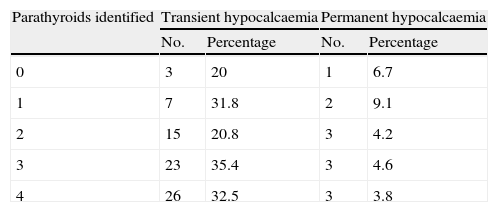Hypocalcaemia, although usually transitory, is the most frequent complication after total thyroidectomy.
ObjectiveTo identify factors associated with a higher risk of hypoparathyroidism and related to aetiology and surgical procedure.
Materials and methodsA total of 254 total thyroidectomies were analysed for the incidence of transitory or permanent hypocalcaemia based on the relationship with etiological and surgical factors.
ResultsTransient hypocalcaemia was present in 29.1% of the cases and permanent hypocalcaemia was present in 4.7%. Postoperative hypocalcaemia was lower in patients with completion thyroidectomy than in patients that underwent total thyroidectomy in a single operation, 12% vs 31%. Patients with Graves–Basedow disease developed postoperative hypocalcaemia in 50% of the cases. Mean recovery time of parathyroid function was 5.2 months, with 72.2% of the patients recovering before 6 months.
ConclusionsPostoperative hypocalcaemia is a frequent complication of total thyroidectomy, but it is seldom permanent. Patients with Graves–Basedow disease have a higher incidence of postoperative hypocalcaemia and need closer follow-up. Postoperative calcium level analysis at 24 and 48h after surgery is not useful for rapid identification of patients at high risk of hypocalcaemia.
La hipocalcemia es la complicación más frecuente de la tiroidectomía total, si bien pasajera en la mayoría de los casos.
ObjetivoIdentificar factores patológicos y quirúrgicos, que pudieran estar asociados a un mayor riesgo de hipocalcemia.
Material y métodoSe analizaron 254 pacientes sometidos a tiroidectomía total, analizando la incidencia de hipocalcemia postoperatoria y definitiva en función de los factores relacionados con la etiología de la afección tiroidea y los factores quirúrgicos.
ResultadosEl 29,1% presentó hipocalcemia postoperatoria y el 4,7% hipocalcemia definitiva. La incidencia de hipocalcemia postoperatoria fue significativamente menor (p<0,05) en pacientes a los que se les completaba la tiroidectomía total en un segundo tiempo, 12 vs 31% cuando se realizaba la tiroidectomía total en un solo tiempo. Los pacientes con Graves-Basedow presentaron hipocalcemia postoperatoria en el 50% de los casos. El tiempo medio de recuperación de la función paratiroidea fue de 5,2 meses y en el 72,2% se produjo antes de los 6 meses.
ConclusionesLa presencia de hipocalcemia postoperatoria es una complicación frecuente de la tiroidectomía total, que se recupera en la mayoría de las ocasiones. Los pacientes con Graves-Basedow tienen un mayor riesgo de padecer esta complicación, por lo que deben ser controlados de forma estrecha. El control postoperatorio a las 24 y 48h no es útil en la identificación de los pacientes con riesgo de hipocalcemia.






